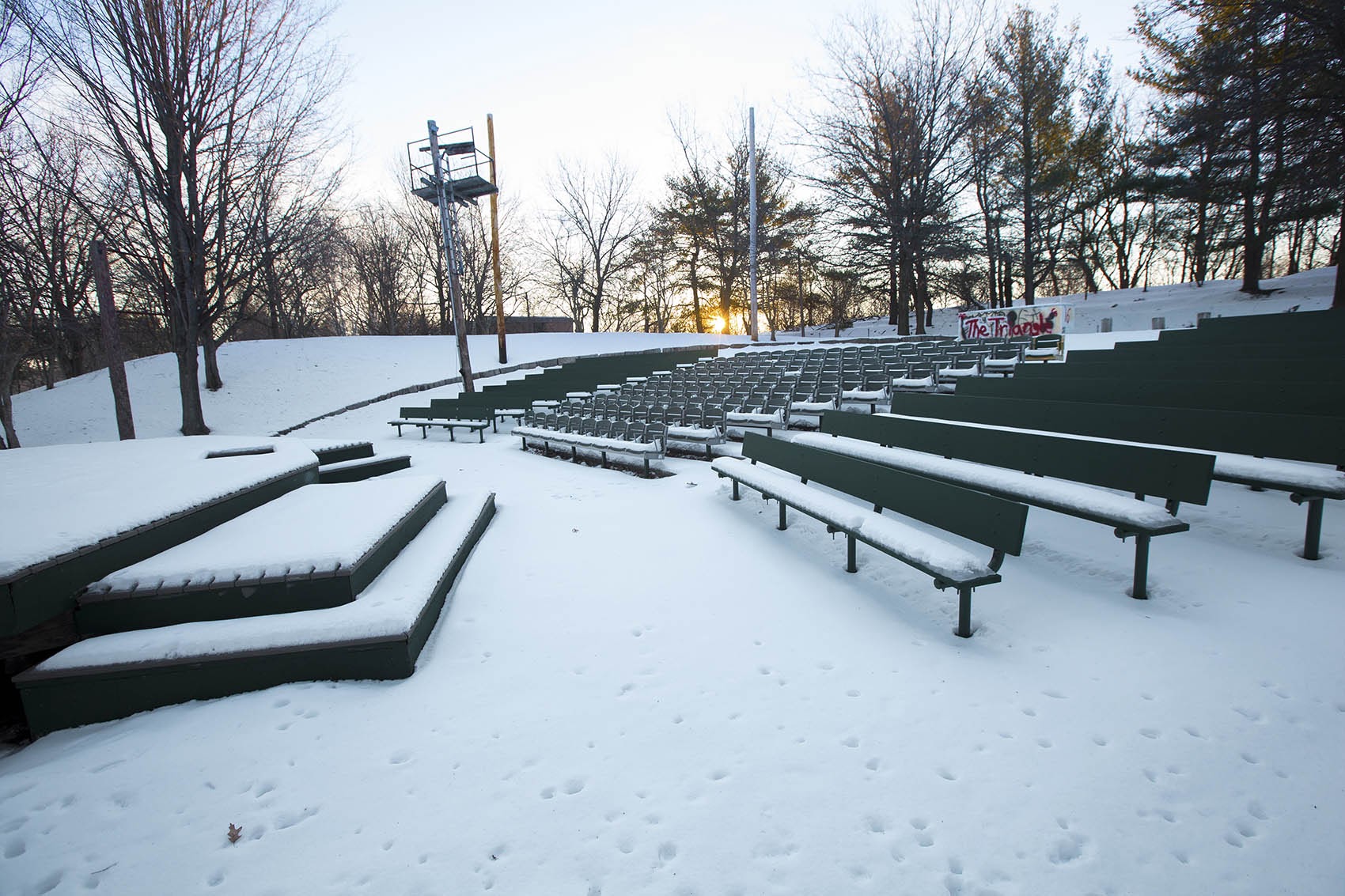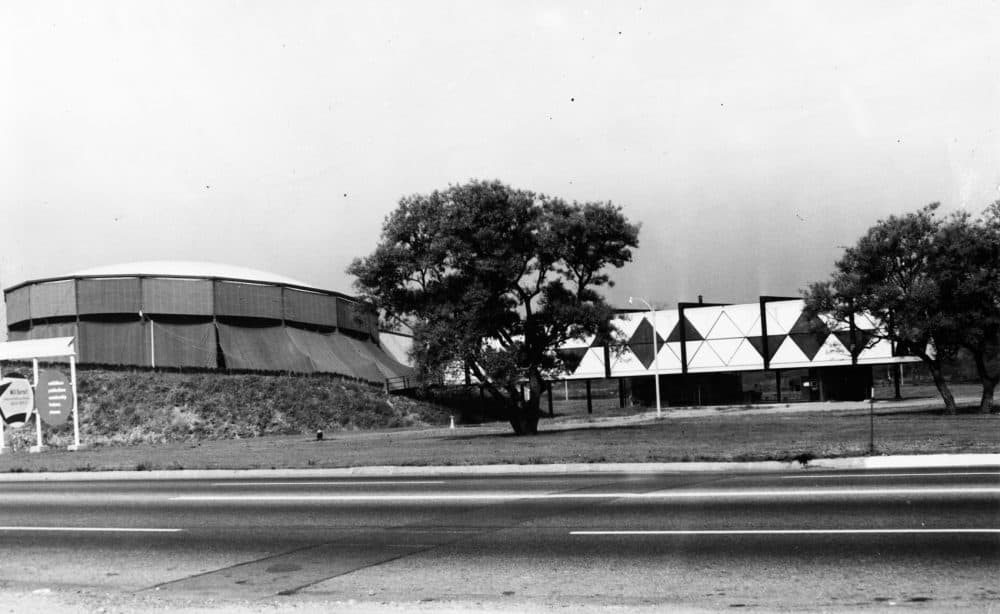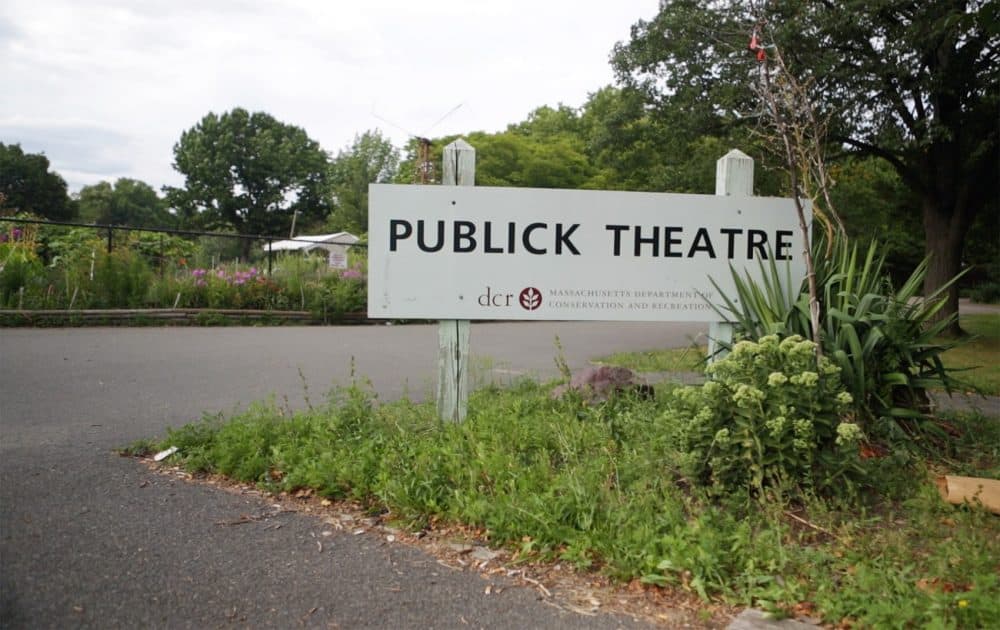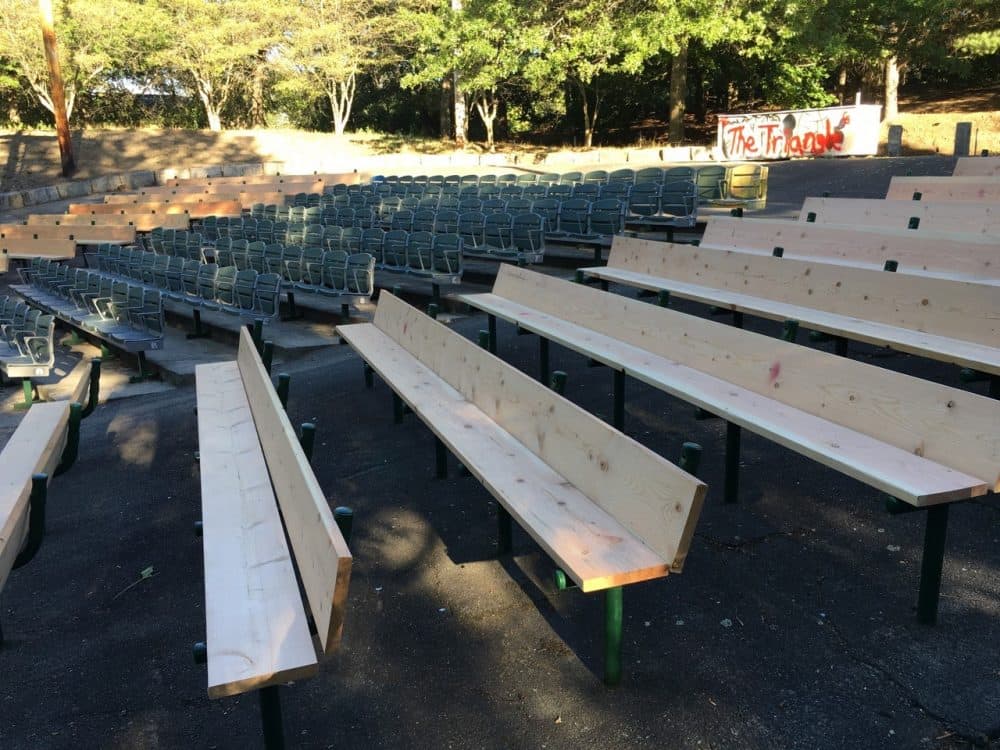Advertisement
Allston's Longtime Outdoor Arts Space To Come Back To Life After 7 Years

Theatergoers who’ve been around Boston for a decade or more probably know there’s an amphitheater set in a clearing on the wooded banks of the Charles River in Allston’s Christian Herter Park. It served as the summer home of the Publick Theatre, now defunct, for 38 years before falling into disrepair.
But few people know the amphitheater is making a comeback. Work is already underway to prepare for programming there this summer. A new nonprofit based in Allston has raised $75,000 in private funding for rehabilitating the site, and has already scheduled theater performances there in August. The group is now negotiating logistical details with the Department of Conservation and Recreation, which operates Herter Park.
Still fewer may know the site’s backstory — that the original tented theater there seated 1,800 patrons; that its early years were tainted by graft; and that, for a few years, a building on the site housed one of Boston's premier art institutions.
The story of the Herter Park amphitheater begins in the Eisenhower era. A July 1959 article in the New York Times entitled “A Center of Arts Opens in Boston” recounts the festive inauguration of the Metropolitan Boston Arts Center, attended by dignitaries who arrived ceremoniously by boat. It describes the theater as having “canvas walls around the stage” and a seating area covered by an inflatable “lens-shaped” roof that rested on a steel hoop, creating an enormous drum-like tent 145 feet in diameter. The article further notes that the Institute of Contemporary Art would occupy a new modernist building constructed just steps away.

In its original conception, the Metropolitan Boston Arts Center included a cavernous opera house and a restaurant on the site in addition to the gallery and theater. But the complex was beset by financial troubles and political squabbles from the start. Interest in the proposed restaurant and opera house evaporated as it became apparent that the distance from the city and the lack of public transit were disqualifying obstacles. Soon it emerged that the commissioner of the Metropolitan District Commission (MDC) was lining his pockets by diverting insurance business for the arts center to a firm in which he held a significant financial interest.
Controversy erupted when the Cambridge Drama Festival, a theater company well-represented on the arts center’s board, was granted an exclusive contract to stage performances. A competing troupe from Wellesley cried foul to no avail, creating acrimony within the theater community. Soon after, the problematic inflated roof of the theater, which workers had to take down and store each fall, became another expensive boondoggle that was plagued by shady contracts and criminal charges.
After just three short seasons, the Cambridge Drama Festival walked away. When the theater’s stage and much of its seating burned in May 1964, the MDC decided against rebuilding it. A Boston Globe story on the fire noted that the theater had not been in use for more than two years, and another article in December of that year reported that the MDC planned to demolish what remained of the theater. It had become a political punching bag, emblematic of poor planning, corruption and wasted public funds. The ICA had already quit its home in the adjacent building and relocated to Back Bay the prior year.
It was not until 1971 that performances returned to the bucolic Allston site. The Publick Theatre, founded on a shoestring by Donato Colucci, staged Shakespeare’s “Comedy of Errors” there in July of that year. Lacking lighting, the curtain rose on the makeshift stage at 7 o’clock so that the play could finish before dark. It was as bare bones a "Shakespeare in the Park" as one could imagine.

Despite its humble beginnings, the Publick Theatre soon found the right mix of actors, plays and money to sustain a spirited summer theater program miles from downtown. By the summer of 1978, according to a Globe article, the troupe was playing on an Elizabethan stage funded by the MDC, with permanent light towers and comfortable seating for 375 in an amphitheater facing the Charles.
The setting offered unique staging opportunities. Directors creatively incorporated the view of the river and the grassy berms around the seating area into the productions. The surrounding woods made the perfect backdrop for plays such as “A Midsummer Night’s Dream” and Tom Stoppard’s “Arcadia” in 2005.
With aspirations more modest than those of the Metropolitan Boston Arts Center, the Publick Theatre achieved a durable success in Herter Park under a succession of leaders, including Spiro Veloudos and Diego Arciniegas. During the Publick Theatre's residency, the venue was a summertime arts fixture in Boston.
And then, around 2009, things quite literally fell apart. Exposed to the elements, the amphitheater’s lighting structures and wooden stage had begun to rot away, and state funding for maintenance and renovations dried up in the recession. At the same time, the Publick Theatre felt a need for a home more accessible by transit, and a home in which an evening’s receipts wouldn’t be forfeited to a stormy weather forecast. It left Herter Park for the Boston Center for the Arts in the South End, ceding the Herter space to the Orfeo Group, which performed there without lighting in the summer of 2010. After that, the surrounding woods encroached, graffiti marred the stage and rust coated the seat bolts. A 39-year run of performances at the site had ended.
Today, while the physical structure of the amphitheater has deteriorated, the pastoral charm of the place remains. And Herter Park has become a community meeting ground -- a destination for runners, cyclists, picnickers, kayakers, gardeners and sunbathers alike. The only thing that’s missing is the arts.
It was the absence of cultural activity — in combination with the conspicuous opportunity of the idle amphitheater — that inspired community developer Michelle Ciccolo, of Allston, to take action. As the head of a community development consulting firm, she had experience in municipal planning that positioned her to tap into resources that could restore the amphitheater to its former resplendence. In 2016, Ciccolo partnered with Herbert Nolan, director of the Solomon Foundation, to bootstrap Friends of Herter Park, a nonprofit whose mission is to revitalize the amphitheater.
Friends of Herter Park is tied into a network of activists, philanthropists, planners and performing arts leaders who contribute a range of skills and capabilities to the cause. Nolan and the Solomon Foundation have a long history of working with the Department of Conservation and Recreation to develop high-value projects in the Charles River parklands. Renata von Tscharner, president of the Charles River Conservancy, and her staff have already organized several clean-up efforts where volunteers clear brush, prune trees and remove trash from the site. And Anthony Mullin, president of the Longwood Players, brings his close connection to the local theater community.
The team has already scored a success in securing a $50,000 grant from the Harvard-Allston Public Realm Flexible Fund. The largest portion of that money will go toward electrical work on the lighting system, and the remaining funds will be spent on landscaping and repair of the stage and seating area. Both the Solomon Foundation and the Ciccolo Family Foundation have made additional donations. According to Ciccolo, that will be enough to enable performances at the amphitheater to resume this summer.

The plan is not to limit the space to theater productions, but to present a diverse program that may include music, dance, films, lectures, poetry and shows for children. Joy Lamberton-Arcolano, chair of the programming committee for the Friends, reports that several dates are already booked, including a run of “Hamlet” by the Brown Box Theater Project in August.
The vision behind the 1959 Metropolitan Boston Arts Center is starkly different than that of the Friends of Herter Park. The former was grand and self-important, aiming to draw the social elite from Boston’s upper crust. The latter is about integrating a community-oriented performance space into the parkland.
“In the current political climate, access to the arts is critical because it brings communities together,” Ciccolo said. “We need to focus on arts and culture to combat divisiveness."
